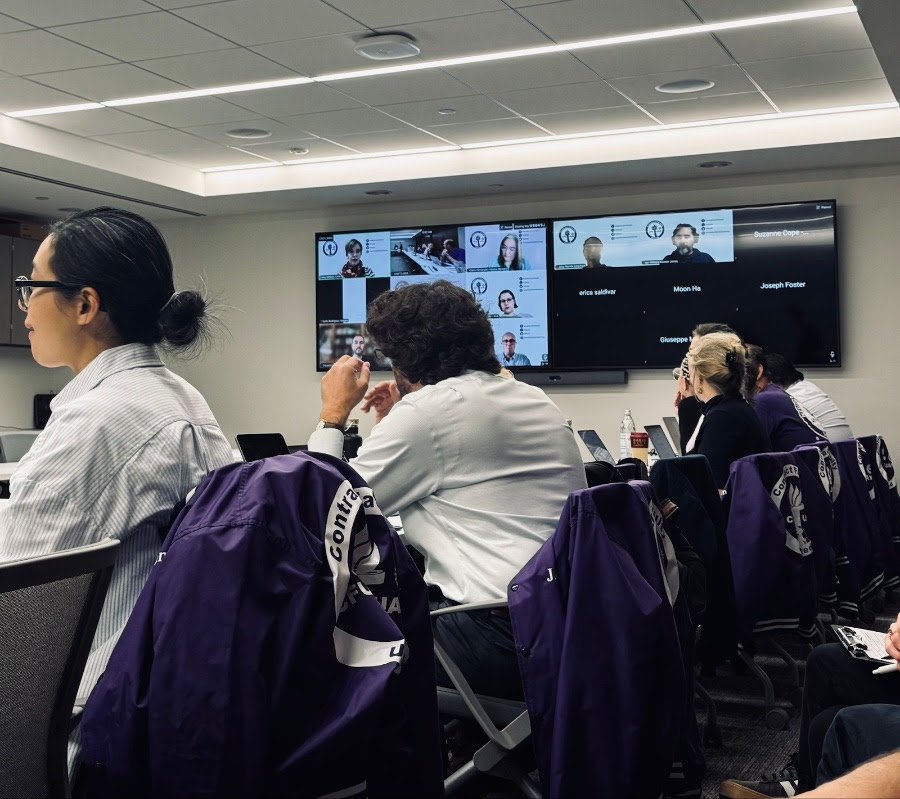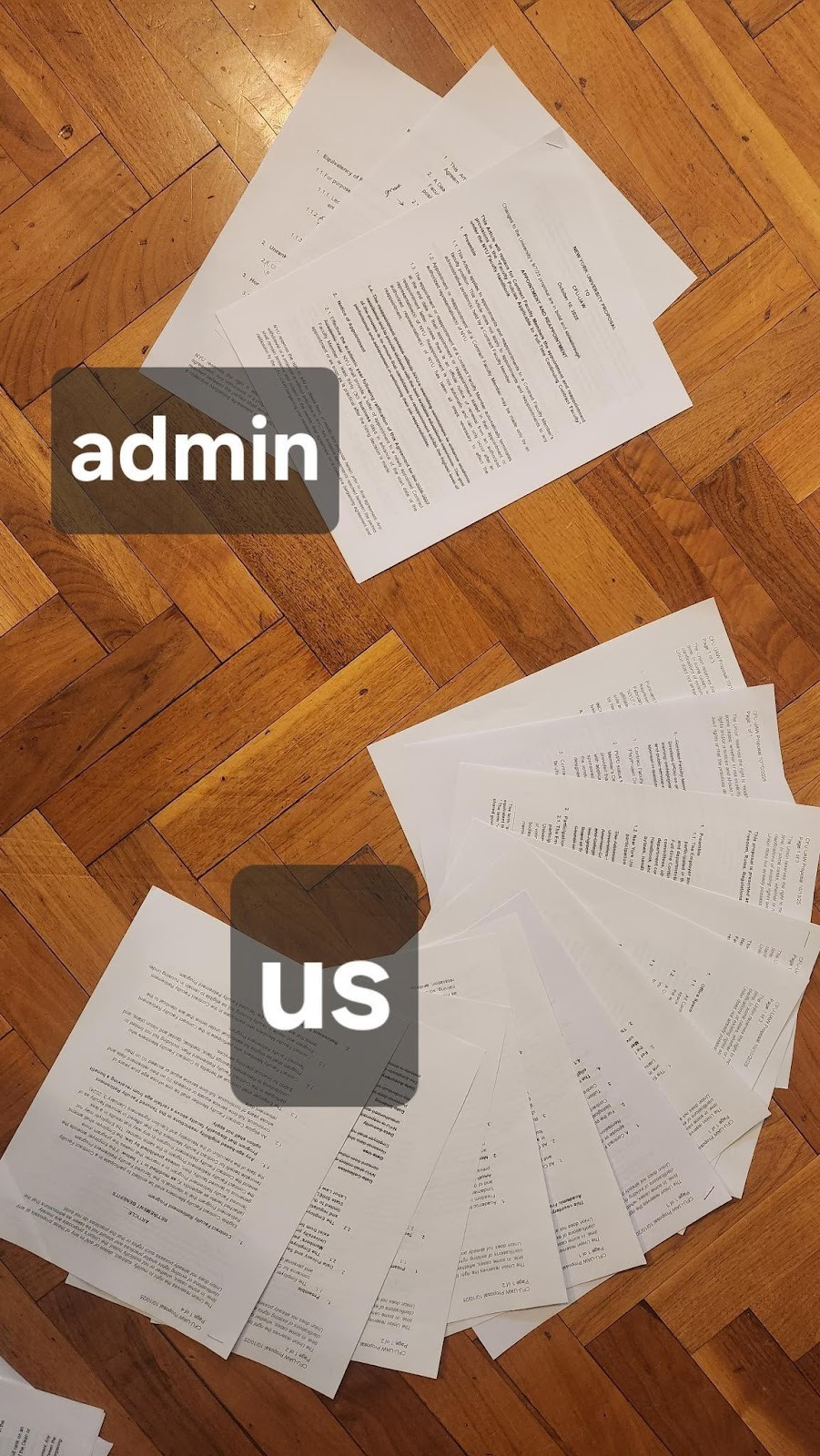
At our last bargaining season on Friday, October 10, we made 14 counterproposals, reasserted four proposals the administration has so far refused to substantively counter, and reserved response on three proposals due to the lack of crucial information we requested from the administration months ago and which we have not yet received. We’ve addressed nearly every issue that was in our court.
By contrast, the administration made three counterproposals and one proposal primarily related to appointments and promotion. We’re dismayed, but not surprised, that the administration’s counterproposals essentially maintain or worsen the status quo, and do not meet key demands ratified by a strong majority of the contract faculty.
Thanks to our observers who attended all or part of the session. We need to continue to pack the room to demonstrate our commitment and resolve as we move deeper into negotiations.
FOUR ADMINISTRATION PROPOSALS AND COUNTERPROPOSALS
The administration presented a new article on Administrative Positions, which would govern some of the extra work we take on to make the university run. They also passed us counterproposals on Appointment and Reappointment, Promotion, and Titles. There is still considerable distance between us, most notably over how to account for differences across schools and disciplines. Where we have proposed that schools or departments use shared governance to set standards for promotion and renewal, the administration wants to set a single standard for all schools and departments — and to do alone.
FOURTEEN CFU COUNTERPROPOSALS
In Workspace & Materials, we were responsive to the administration’s concerns, but we continued to reject their proposal for shared desks and demand private offices and usable, tech-ready classrooms. On compensation, in the spirit of moving closer, we agreed to shave about $60 million off our initial proposal by making increases retroactive to 2025-26 instead of 2024-25. We otherwise are holding on our multipart proposal that solves the four problems of low minimums, salary compression, a 10% salary gap between men and women, and a salary average 36% below our tenure-track peers. (Remember, their counterproposal to our initial multipart proposal was minimum salary floors and AMI – that’s it!)
We also came closer on benefits. We had initially proposed robust improvements; they countered with the status quo, plus the right to worsen the status quo whenever they want. In Tuition Remission, Health, Dental, and Vision Insurance, and Long Term Disability, we held to our proposal that the administration offer substantially equivalent benefits or better, but came closer to them by proposing a tiered system in which contract faculty members making more than $158,640 per year — our proposed floor for clinical associate professor salaries — would contribute to the premium. We continue to demand parity with our tenure-track colleagues in phased retirement and improved health care benefits for retirees while asking for a tiered increase in 403(b) contributions to make up for our years of low and compressed salaries.

Intellectual Property Update
As we wrote last week, over the summer the administration proposed a major revision to the university’s intellectual property policy. Because IP policy is a term and condition of our employment, the administration is legally required to bargain with us before making any changes. Last week we won a major victory: the administration backed down from its plan to take a perpetual and worldwide license to all our scholarship and art. We are continuing to demand protections for and full control of all our intellectual property. On Friday, we reasserted the proposal we first made in February, to which the administration has not yet responded.
We also came substantially closer to the administration on Grievance and Arbitration (while holding on peer review for grievances related to appointment and reappointment), Technological Change, and Data Privacy. We believe we are moving closer to tentative agreement on these issues.
We are much further apart on core topics that will determine what sort of institution NYU should be. We stood by our principles in the Academic Freedom counterproposal but adjusted the language slightly to respond to the administration’s concerns. We continue to insist that the Rules, Regulations, and Policies to which we are held only be changed through the processes of shared governance. Our Shared Governance proposal would protect our essential role in making academic decisions while protecting the gains of our contract. And, where the administration’s proposal on Management and Academic Rights would arrogate to themselves the right to make a huge number of academic decisions, our Management and Academic Rights clearly lays out the responsibilities of the faculty in the governance of the University.
Additionally, we gave the administration two counterproposals — on PI Status and Recognition — that would defend the groundbreaking agreement we made with them in January 2024, which recognized both our right to unionize and our central role in the university as full members of the faculty.
As you can see on our Bargaining Tracker, we’ve left the ball in the administration’s court. What they do next depends on all of us. As we enter this crucial stage of bargaining, our success hinges on our capacity to turn out in large numbers and demand what we deserve.
Join CFU’s Next Escalation Training, Thursday, October 23, 5 – 6:30 pm
RSVP to pack the room (and Zoom) on Friday, October 31, 10 am – 2 pm
Finally, as you may have already seen, the administration’s negotiating team requested mediation in an email to us on Monday, claiming that “the Union made disappointingly little movement on many proposals.” As evidenced above, this characterization is false.
Since February 2024, an overwhelming majority of Contract Faculty voted to form our union, completed bargaining surveys, and ratified bargaining demands. Since we started bargaining a year ago, a strong majority of faculty signed a petition demanding academic freedom protections be written in across our contract and hundreds have rallied for a strong first contract. The truth is this: we have made substantial movement towards the administration on a significant number of topics and are close to a tentative agreement on several more. Yet the administration’s team has not yet made meaningful movement towards the contract faculty on our key demands. Attend the next bargaining session and see for yourself.
In solidarity,
CFU-UAW BARGAINING COMMITTEE
Richard Dorritie (Rory Meyers College of Nursing)
Elisabeth Fay (Expository Writing Program, Arts & Science)
Robin Harvey (Teaching and Learning, Steinhardt)
Thomas Hill (Center for Global Affairs, SPS)
Peter Li (General Engineering, Tandon)
Benedetta Piantella (Technology, Culture, and Society, Tandon)
Jacob Remes (Gallatin School of Individualized Study)
Chris Chan Roberson (Undergraduate Film & TV, Tisch)
Jamie Root (French Literature, Thought and Culture, Arts & Science)
Fanny Shum (Mathematics, Courant Institute)
Heidi White (Liberal Studies)
